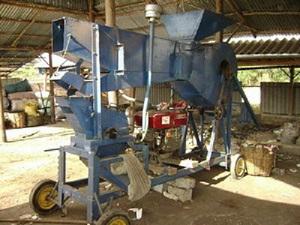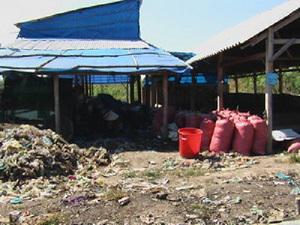Bernard Kervyn
Other projects
Hopefully the project will be ready for replication in the other districts where we operate, later this year. For that phase larger funding will be sought.

The grinding machine.
After positive feedback from the field testing for our compost, we are improving the equipment and procedure, and are in the process of defining our marketing strategy (compost sales will have to be subsidized for a while). Hopefully the project will be ready for replication in the other districts where we operate, later this year. For that phase larger funding will be sought.

While waste recycling and production of compost are no longer complicated technical matters, the fact we operate in remote rural areas complicate this a lot:
- the local authorities are poor, investment must probably be limited to 10 KE, and the program should be sustainable within a few years at most;
- in rural areas, the part of solid waste (useless for the time being) is high, organic waste is less.
The Tánh Linh waste recycling program aims at providing a solution to the increasing waste disposal problem, as well as to the increasing demand for compost. Funds are limited in rural areas, so the investment should be minimal and the program sustainable.
It was started with a commitment from a State company to buy organic waste at a fixed price: the company unilaterally cancelled this, faced itself with technical and financial difficulties.
After initial waste sorting, it has been mixed with cow and goat dung to accelerate the decomposition, but this is too costly (dry cow dung is commonly sold at 0,05 €/kg) and inefficient. The cost of decomposition catalysts have been reduced as they are partly reproduced on the site. A grinding machine has been purchased, which allows to increase the waste value significantly.
After conclusive lab tests, 5 tons have been distributed as free to pilot farmers for field tests.